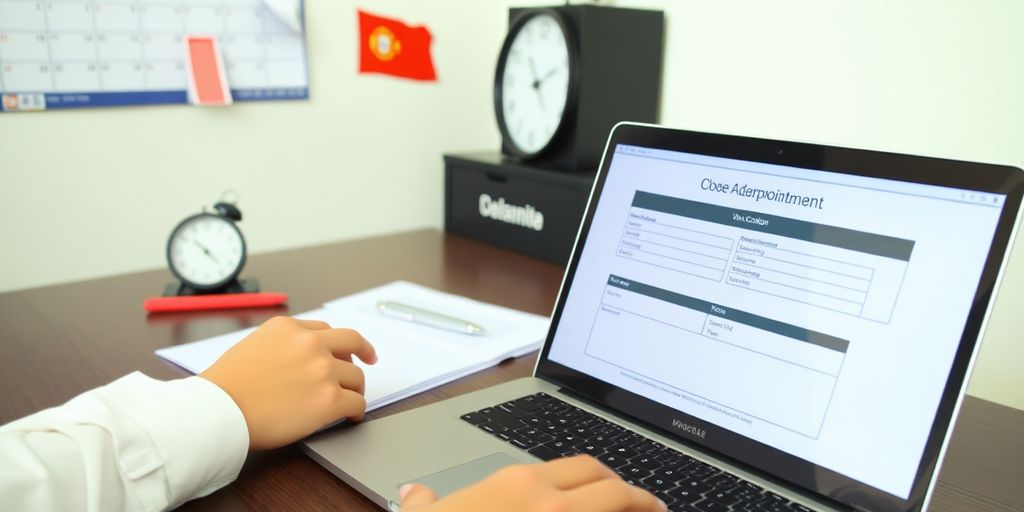
Step-by-Step Guide: How to Apply for a Portuguese Visa Successfully
Thinking about heading to Portugal? Whether it’s for a vacation, work, or study, you’ll need a visa if you’re not from the EU. The process can seem a bit daunting at first, but with the right info, you can make it through without too much hassle. This guide is here to walk you through the steps on how to apply for a Portuguese visa, so you can focus on planning your trip instead of stressing over paperwork.
Key Takeaways
- Understand the different types of Portuguese visas to apply for the right one.
- Gather all necessary documents before starting your application.
- Fill out the application form carefully to avoid mistakes.
- Schedule and prepare for your visa appointment early.
- Keep track of your application status online to stay updated.
Understanding the Portuguese Visa Types

When planning a trip to Portugal, getting the right visa is key. Let’s break down the main types you might need. When planning a trip to Portugal, getting the right visa is key. Let’s break down the main types you might need. Depending on your nationality and the duration of your stay, you may require a Schengen visa for short visits, or a residence visa if you plan to live and work in Portugal. It’s essential to research the different visa types for Portugal and ensure you meet the specific requirements, as each type comes with its own set of documentation and application processes. Be sure to plan ahead, as processing times can vary significantly based on the visa category.
Tourist Visa Requirements
If you’re heading to Portugal for a holiday, you’ll likely need a tourist visa. This visa lets you explore the country for up to 90 days. Here’s what you’ll need:
- A valid passport with at least two blank pages.
- Proof of accommodation, like a hotel booking or a letter from a friend if you’re staying with them.
- A round-trip ticket to show your travel plans.
- Sufficient funds to cover your stay, usually proven by recent bank statements.
Business Visa Essentials
Heading to Portugal for work? The business visa is your go-to. It’s designed for attending meetings, conferences, or exploring business opportunities. Here’s what you need:
- An invitation letter from a Portuguese company detailing the purpose of your visit.
- Documents proving your employment or business ties to your home country.
- Evidence of previous business dealings, if applicable.
- Travel insurance covering the duration of your stay.
Student Visa Application Process
Thinking about studying in Portugal? You’ll need a student visa. This visa allows you to stay for the duration of your course. Here’s how to get started:
- Obtain an acceptance letter from a recognized Portuguese educational institution.
- Prepare proof of financial means to support yourself during your studies.
- Get a criminal record check from your home country.
- Have valid health insurance for your time in Portugal.
Applying for a visa can seem daunting, but with the right preparation, it’s manageable. Each visa type has specific requirements, so make sure to gather all necessary documents before you apply. Getting it right the first time saves a lot of hassle later.
Gathering Necessary Documentation
Before you even think about applying for a Portuguese visa, make sure you’ve got all your paperwork sorted. Missing a single document can delay your application. Let’s break down what you need to gather.
Passport and Personal Identification
Your passport is your number one priority. It should be valid for at least six months beyond your planned stay in Portugal. Make sure you have a couple of blank pages for visas and stamps. Don’t forget a photocopy of your passport’s info page and any previous visas. You’ll also need a recent passport-sized photo — think about getting a few extra just in case. Additionally, it’s essential to familiarize yourself with the legal requirements for living in Portugal, especially if you plan to stay for an extended period. Research any necessary visas or residency permits and ensure that all documentation is correctly submitted before your arrival. This preparation will help you navigate the process smoothly and enable you to enjoy your time in the country without unnecessary complications.
Proof of Financial Means
You need to show that you can financially support yourself while in Portugal. This could be through bank statements, a letter from your employer, or other financial documents. Proof of funds is crucial, so make sure everything is up to date. If you’re applying for a Portugal residency visa, this is especially important, as they need to see you won’t be a financial burden. It’s advisable to prepare a comprehensive financial portfolio that outlines your income sources, savings, and any additional financial support. This will not only strengthen your application but also provide you with peace of mind during the permanent residency process in Portugal. Additionally, demonstrating stable financial resources can enhance your chances of approval, as it reassures authorities of your ability to thrive independently in the country.
Travel Insurance Details
Travel insurance is a must-have. It should cover any potential medical expenses, emergencies, or even repatriation if needed. Double-check that your policy meets the requirements set by Portuguese authorities. It’s better to be safe than sorry, right?
Make sure you double-check all your documents before submission. A little oversight can lead to big headaches later on.
So, there you have it. Get all these documents ready, and you’ll be one step closer to your Portuguese adventure. Don’t leave it to the last minute, because gathering everything can take more time than you think.
Filling Out the Visa Application Form
Getting your visa application form right is a big deal. It’s the first step in your visa journey, and trust me, you don’t want to mess it up. Here’s how to get it done smoothly.
Accessing the Application Portal
To kick things off, you’ll need to create an account on the E-Visa portal. After signing up, they’ll send you a Token code via email. Pop that code in to activate your account, then log in. Once you’re in, you’re ready to start the application process.
Step-by-Step Form Instructions
Filling out the form can feel like a chore, but breaking it down helps. Here’s a simple guide:
- Personal Information: Fill in your full name, date of birth, and nationality. Make sure it matches your passport.
- Travel Details: Enter your travel dates, purpose of visit, and where you’ll be staying in Portugal.
- Contact Information: Provide your email address and phone number. Double-check for any typos.
- Supporting Documents: Upload scanned copies of your passport, photos, and any other required documents.
It’s a good idea to review everything before hitting submit. One small mistake can slow things down.
Common Mistakes to Avoid
While filling out the form, steer clear of these common slip-ups:
- Incorrect Personal Details: Any mismatch with your passport info can lead to delays.
- Forgetting to upload documents: Make sure all required files are attached.
- Ignoring mandatory fields: Leaving these blank can cause application rejection.
Filling out forms might seem like a minor task, but it’s the foundation of your visa application. A little attention to detail goes a long way. If you overlook small details or provide inaccurate information, it could lead to delays or even a rejection of your request. To help streamline the process, it’s essential to familiarize yourself with the necessary documentation and requirements. For a comprehensive overview, you can find the visa application steps explained in various online resources, guiding you through each phase effectively.
By following these steps and tips, you’re setting yourself up for a smooth application process. Remember, patience and precision are your best friends here.
Scheduling and Attending Your Visa Appointment

Scheduling your visa appointment is a big step in getting your Portuguese visa. Here’s how to make sure you’re ready for it.
Booking Your Appointment Online
First things first, you’ll need to book your appointment online. Make sure you have all your documents ready because you might need to upload some while booking. Usually, you’ll do this through the official visa application portal. It’s a good idea to check the appropriate visa type to know what documents and fees are needed.
Preparing for the Interview
Once your appointment is set, it’s time to get ready for the interview. Think of it like a job interview, but for your visa. Here’s how you can prepare:
- Gather all necessary documents, including your passport and any supporting paperwork.
- Practice answering common interview questions related to your travel plans and stay in Portugal.
- Dress appropriately; smart casual is usually a safe bet.
What to Expect During the Appointment
On the day of your appointment, arrive early to avoid any last-minute stress. You’ll go through security checks, so pack light. Here’s a quick rundown of what usually happens:
- Check-in at the reception and present your appointment confirmation.
- Submit your documents for verification.
- Attend the interview where you’ll discuss your travel intentions.
Remember, staying calm and being honest during the interview can help you a lot.
After the interview, you’ll be informed about the next steps. Keep an eye on your email or the application portal for updates on your visa status. Good luck!
Tracking Your Visa Application Status
Navigating the process of tracking your Portuguese visa application can feel like a daunting task, but breaking it down into manageable steps can help. Ensuring you’re informed about each stage of the process is crucial to alleviate anxiety and plan your next steps effectively.
Using the Online Tracking System
Once you’ve submitted your visa application, the next step is to keep tabs on its progress. Many applicants opt for the online tracking system, which provides real-time updates. Here’s how to use it:
- Log in to the official visa application website using your credentials.
- Enter your application reference number—this is typically found on your application receipt.
- Check the status regularly to stay updated. Changes in status will reflect different stages of the application process.
Staying on top of your application status helps in planning your travel and preparing for potential follow-ups.
Understanding Processing Times
Processing times can vary based on the type of visa and the time of year. Typically, tourist visas might take a few weeks, while student or business visas can take longer due to additional documentation requirements. It’s important to start your application process well in advance of your intended travel date.
- Tourist Visa: Usually processed within 15-30 days.
- Business Visa: Can take up to 45 days.
- Student Visa: Might require 60 days or more, especially during peak periods.
What to Do If Your Application Is Delayed
Delays can happen, and it’s best to be prepared. If your application seems stuck:
- Contact the visa application center for updates. Sometimes, additional documents or clarifications are needed.
- Check your email regularly for any communication from the embassy or consulate.
- Consider seeking assistance from the official partner of the Embassy of Portugal in the USA if you’re applying from the U.S. They can provide guidance and support in understanding the delay.
Keeping informed and proactive during the visa application process can significantly ease the stress and ensure a smoother journey to obtaining your Portuguese visa.
Receiving and Using Your Portuguese Visa
Collecting Your Visa
Once your Portuguese visa is approved, the next step is to collect it. Typically, you’ll get a notification from the consulate or visa center. Don’t forget to bring your ID and any receipt they gave you when you applied. Sometimes, they might let you know by email or phone, so keep an eye on those. It’s usually best to pick it up in person, but some places offer mail delivery. Check the details with your local consulate.
Checking Visa Details for Accuracy
Before you start planning your trip, make sure all the details on your visa are spot on. Look at your name, passport number, and the visa’s validity dates. Mistakes here can mess up your travel plans. If anything’s wrong, contact the consulate immediately. They can guide you on how to fix it. It’s better to sort this out sooner rather than later.
Planning Your Travel to Portugal
With your visa in hand, you can finally start planning your trip to Portugal. Make a checklist of things you need to do before you go:
- Book your flights and accommodation.
- Arrange transportation from the airport.
- Plan your itinerary and activities.
Traveling to Portugal is exciting, but remember to keep all your documents handy. Having everything organized will help you enjoy your trip without any hitches.
Always double-check travel restrictions or requirements related to health and safety. It’s good to be prepared!
Handling Visa Denials and Appeals
Reasons for Visa Denial
Getting a visa denied can be a real bummer. It happens for a bunch of reasons though. Incomplete paperwork is a biggie. Make sure you’ve got everything they ask for. Then there’s financial stability. They want to know you can support yourself while you’re there. And sometimes, it’s just plain old bad luck with timing or political stuff.
How to Appeal a Visa Decision
So, your visa got denied. Now what? You can appeal it! Start by figuring out why it was denied. Check the letter they sent you. Then, gather any missing documents or evidence. Write a clear appeal letter. Learn to craft an effective Schengen visa appeal letter with step-by-step instructions. Make sure to address each reason they gave for the denial. Send it off and cross your fingers.
Reapplying After a Denial
If the appeal doesn’t work, or you just want to try again, reapplying is an option. First, review why it was denied. Fix those issues. Maybe it was missing documents or something about your financials. Ensure everything is spot on this time. Then, fill out the application again, double-checking every detail. Be patient, and hopefully, you’ll get a “yes” this time.
Sometimes, it takes a couple tries to get it right. Don’t lose hope if it doesn’t work out the first time. Keep at it, and you’ll eventually get there.
Wrapping It Up
So, there you have it! Getting your Portuguese visa might seem like a mountain to climb at first, but with the right steps, it’s totally doable. Just remember to gather all your documents, fill out the forms carefully, and keep track of your application status. It might take a bit of patience, but once you have that visa in hand, you’ll be all set for your adventure in Portugal. Whether you’re going for work, study, or just to explore, this guide should help you get through the process without too much hassle. Safe travels and enjoy everything Portugal has to offer!
Frequently Asked Questions
What types of visas can I apply for in Portugal?
Portugal offers several types of visas, including tourist, business, and student visas. Each has its own set of requirements. For those looking to stay longer, the country also provides residence visas for retirees, investors, and skilled workers. When considering a move or an extended visit, it is essential to do thorough research. Many individuals are now exploring visa options in Portugal to find the best fit for their needs and lifestyle.
How long does it take to process a Portuguese visa?
Visa processing times can vary, but it typically takes a few weeks. It’s a good idea to apply well in advance of your planned travel. Visa processing times can vary, but it typically takes a few weeks. It’s a good idea to apply well in advance of your planned travel. Be sure to check the specific visa application requirements for the country you intend to visit, as these can differ significantly. In addition, ensuring that all documentation is complete and submitted on time can help avoid unnecessary delays. Always keep track of your application’s status to address any potential issues swiftly.
What documents do I need for a Portuguese visa application?
You’ll need a valid passport, proof of financial means, travel insurance, and possibly more depending on the visa type.
How can I track my visa application status?
You can track your application online through the official visa application website by entering your application details.
What should I do if my visa application is denied?
If your application is denied, you can appeal the decision or reapply. Make sure to address the reasons for denial in your new application.
Do I need to attend an interview for a Portuguese visa?
Yes, attending an interview is usually part of the process. You’ll need to schedule an appointment and prepare for questions about your application.



